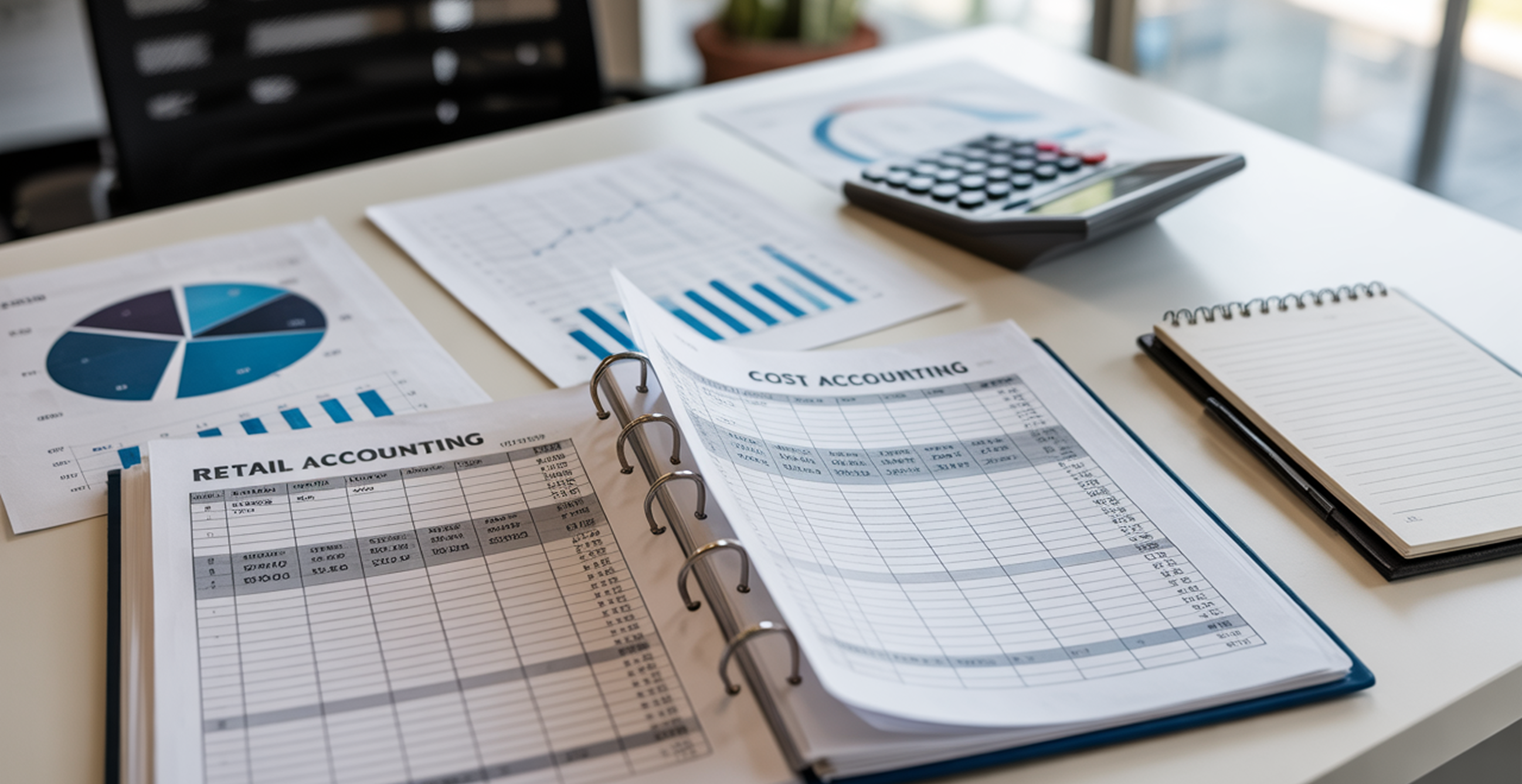Retail Accounting vs. Cost Accounting: What’s Right for Your Business?



Plan your expenses and deductions strategically each year
Egestas tincidunt ipsum in leo suspendisse turpis ultrices blandit augue eu amet vitae morbi egestas sed sem cras accumsan ipsum suscipit duis molestie elit libero malesuada lorem ut netus sagittis lacus pellentesque viverra velit cursus sapien sed iaculis cras at egestas duis maecenas nibh suscipit duis litum molestie elit libero malesuada lorem curabitur diam eros.
- Morbi fringilla molestie magna sed dictum. Praesent pharetra turpis augue.
- Cras mi purus, viverra vitae felis sit amet, tincidunt fringilla lorem.
- non mattis urna ex nec sem. Donec varius diam et suscipit venenati proin tincidunt
- Quisque euismod posuere lacus sit amet volutpat. Praesent vel imperdiet
Maintain accurate and organized financial records for easy reporting
Tincidunt pharetra at nec morbi senectus ut in lorem senectus nunc felis ipsum vulputate enim gravida ipsum amet lacus habitasse eget tristique nam molestie et in risus sed fermentum neque elit eu diam donec vitae ultricies nec urna cras congue et arcu nunc aliquam at.

Talk to a tax professional for expert guidance
At mattis sit fusce mattis amet sagittis egestas ipsum nunc scelerisque id pulvinar sit viverra euismod. Metus ac elementum libero arcu pellentesque magna lacus duis viverra pharetra phasellus eget orci vitae ullamcorper viverra sed accumsan elit adipiscing dignissim nullam facilisis aenean tincidunt elit. Non rhoncus ut felis vitae massa mi ornare et elit. In dapibus.
- Morbi fringilla molestie magna sed dictum. Praesent pharetra turpis augue.
- Cras mi purus, viverra vitae felis sit amet, tincidunt fringilla lorem.
- non mattis urna ex nec sem. Donec varius diam et suscipit venenati proin tincidunt
- Quisque euismod posuere lacus sit amet volutpat. Praesent vel imperdiet
Personalized Marketing: AI helps in analyzing customer data to create personalized marketing campaigns
At mattis sit fusce mattis amet sagittis egestas ipsum nunc. Scelerisque id pulvinar sit viverra euismod. Metus ac elementum libero arcu pellentesque magna lacus duis viverra. Pharetra phasellus eget orci vitae ullamcorper viverra sed accumsan. Elit adipiscing dignissim nullam facilisis aenean tincidunt elit. Non rhoncus ut felis vitae massa. Elementum elit ipsum tellus hac mi ornare et elit. In dapibus.
“Amet pretium consectetur dui aliquam. Nisi quam facilisi consequat felis sit elit dapibus ipsum nullam est libero pulvinar purus et risus facilisis”
Use accounting and tax software to make management easier
Placerat dui faucibus non accumsan interdum auctor semper consequat vitae egestas malesuada quam aliquam est ultrices enim tristique facilisis est pellentesque lectus ac arcu bibendum urna nisl pharetra bibendum felis senectus dolor commodo quam elementum sapien suscipit qat non elit sagittis aliquam a cursus praesent diam lectus tellus mi lobortis in amet ac imperdiet feugiat tristique nulla eros mauris id aenean a sagittis et pellentesque integer ultricies sit non habitant in cras posuere dolor fames.
🧮 Retail vs. Cost Accounting: Choosing the Right Inventory Method for Your Business
If your business manages inventory, your accounting method isn’t just a back-office detail — it can shape your pricing strategy, tax reporting, and financial insights. Two common approaches are retail accounting and cost accounting, and each comes with unique pros, cons, and ideal use cases.
Let’s break them down so you can decide which one fits your business best.
🛍️ What Is Retail Accounting?
Retail accounting estimates the cost of inventory by applying a standard markup to the retail price. It simplifies your inventory calculations by assuming a consistent profit margin across products.
Example:
If you have $80,000 in inventory at retail and your typical markup is 50%, then your estimated inventory cost is:
$80,000 ÷ 1.5 = $53,333
This method avoids the need for detailed item tracking, offering speed and simplicity.
Best For:
- 🏬 High-volume retailers
- 🧾 Stores with uniform markups
- 📊 Businesses needing fast monthly reporting
Advantages:
✅ Easy to implement and maintain
✅ Ideal for retailers with consistent pricing
✅ Speeds up end-of-month closings
Drawbacks:
❌ Less accurate if markups vary
❌ Doesn’t track profit at the item level
❌ Not accepted alone for IRS or GAAP reporting
⚙️ What Is Cost Accounting?
Cost accounting tracks the actual cost to produce or acquire inventory — including materials, labor, and overhead. It provides detailed, accurate financial information but requires more time and effort.
Best For:
- 🏗️ Manufacturers and wholesalers
- 🎯 Custom or high-variation products
- 📈 Businesses focused on strategic pricing and forecasting
Advantages:
✅ High accuracy in tracking inventory and COGS
✅ Fully accepted by the IRS and lenders
✅ Valuable for pricing analysis and financial planning
Drawbacks:
❌ Labor-intensive setup and maintenance
❌ Requires thorough documentation
❌ Can be overkill for fast-turn, low-cost inventory
📋 Retail vs. Cost Accounting: A Side-by-Side Comparison
Simplicity
🛍️ Retail Accounting: ✅ High
⚙️ Cost Accounting: ❌ Low
Accuracy
🛍️ Retail Accounting: ❌ Moderate
⚙️ Cost Accounting: ✅ High
Inventory Valuation
🛍️ Retail Accounting: Based on markup
⚙️ Cost Accounting: Based on actual cost
IRS Compliance
🛍️ Retail Accounting: ❌ Not compliant alone
⚙️ Cost Accounting: ✅ Fully compliant
Best For
🛍️ Retail Accounting: Retailers with fast stock
⚙️ Cost Accounting: Manufacturers and wholesalers
🤔 Which Method Is Right for You?
Choosing between retail and cost accounting depends on:
- 📦 Your business model
- 📉 Inventory complexity
- 🧠 Need for accuracy vs. simplicity
- 🧾 Tax and reporting requirements
If you run a high-volume retail shop with uniform pricing and need quick estimates, retail accounting can simplify operations.
If you’re focused on financial accuracy, cost controls, or long-term growth, cost accounting provides the detail you need for smarter decisions.
📌 Final Thoughts
Inventory accounting isn’t one-size-fits-all. By selecting the right method, you can improve your financial visibility, comply with tax rules, and scale your operations confidently.
Still unsure which approach is best?
👉 Contact us today! Our expert team at Peak Accounting will evaluate your inventory and help implement a method that fits your business goals.
.svg)
%20B2.png)
%20B-3.png)
